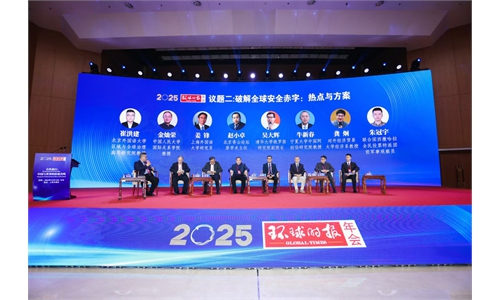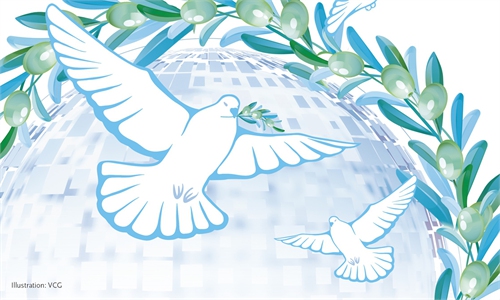Editor's Note:
Chinese President Xi Jinping recently emphasized during his visit to Russia that China and Russia, both major countries of the world and permanent members of the UN Security Council, will join hands to safeguard the victorious outcome of WWII and firmly safeguard the UN-centered international system and the international order underpinned by international law. What is the practical significance of China and Russia's commitment to upholding the purposes of the UN Charter? How should China and Russia speak out on the international stage? Global Times (GT) reporters interviewed Kirill Babaev (Babaev), director of the Institute of China and Contemporary Asia of the Russian Academy of Sciences, on these issues. The institute established the first laboratory dedicated to the study of Xi Jinping Thought on Socialism with Chinese Characteristics for a New Era (Xi Jinping Thought) in Russia in 2023.
GT: How do Russian scholars study Xi Jinping Thought, and what are the outcomes? When did you personally start paying attention to and studying Xi Jinping Thought?
Babaev: The most important work involves studying President Xi's public speeches, articles and official documents regarding contemporary Chinese policy. At every large convention and conference, there is a speech by the leader of China which puts forward ideas for the future. These ideas create an impetus for the future direction of the country. This is very important, because in China, policy is usually based on ideas. Even in ancient times, Chinese civilization has been a civilization of ideas. In our institute, we understand that the Russian authorities, business community and scientific community need this understanding. They need to grasp the common ground for China's development, to understand why China is pursuing this path and why it is making its policies in this way. The only way to achieve this is to comprehend the ideas behind all the policies - Xi Jinping Thought.
We need to know what it is, and we need to understand it; otherwise, we will not be able to understand China's motivation and we will not be able to forecast where China is heading.
Russian officials and businesspeople need to understand Xi Jinping Thought in order to work efficiently with China. China is our main strategic partner and our main economic partner, and this understanding is key to building a reliable partnership.
GT: Why did China and Russia join hands to commemorate the victory of WWII? Against the backdrop of certain countries promoting unilateralism and hegemonism, what is the practical significance of China and Russia's commitment to upholding the purposes of the UN Charter?
Babaev: The Russian understanding and the Chinese understanding of WWII and its outcomes are very similar. The article published by President Xi in a Russian newspaper on May 7 shows that our views align closely. People in Russia are sure that the Chinese people and the Russian people made the most important contributions to the victory. China in Asia and Russia in Europe - both had suffered more casualties than anyone else in the war. Half of our countries were destroyed by the aggression.
This is why Russia and China are the most important participants in this anniversary, because we know what it meant for our people and what it signifies in terms of the suffering our countries endured. We must use this opportunity to tell the world that we need a common and fair peace for everyone. Otherwise, the world may face another war - another tragic world war that no one needs.
Russia and China also share common views on international relations and the world economy in light of the current global situation. It is very important that both Russia and China believe the world economy cannot function under protectionism, unilateral restrictions, sanctions, tariffs and so on. These measures are damaging the world economy.
Russia and China are trying to demonstrate that only fair treatment for all and fair conditions for trade and economic growth can ensure economic stability worldwide, and I think the majority of countries in the world agree with us.
GT: How should we understand the significance of safeguarding the outcomes of WWII in today's international landscape? In the face of historical nihilism and attempts to distort the origins of the war and shift responsibility, how should China and Russia speak out on the international stage?
Babaev: Today we see that some Western countries are trying to undermine the system of international relations based on UN principles. Russia and China should use the occasion of the 80th anniversary of the WWII victory to show that they both oppose any kind of unilateral decisions in world politics or international relations. Russia and China share a vision for the international relations that is based on UN principles, fair treatment for all and respect for all political systems and national interests. These are the values that Russia and China uphold. President Xi's visit to Moscow is a signal that Russia and China, along with the majority of countries in the world, are striving to preserve peace and ensure collective security for all humanity.
GT: How do you assess the role of the UN-centered international system in maintaining the post-WWII world order? In the context of the ongoing transformation of global governance, how can China and Russia play a leading role in promoting genuine multilateralism?
Babaev: We must preserve the system based on the UN and the UN Security Council. Although both Russia and China support reforming the Security Council, they consistently emphasize the importance of maintaining the UN as the core of the international relations system. This is the only way to prevent future global wars and conflicts.
The world is increasingly looking to Russia and China for global governance. I'm sure that many countries are willing to join in this understanding. Just as we see in BRICS, for example, dozens of countries have already expressed their willingness to join.
Why? Because they recognize that Russia and China represent values shared by much of humanity - respect for the political systems of all countries, respect for the national interests of all countries and respect for the security of every country.
GT: How do you view the strategic coordination between China and Russia in safeguarding international fairness and justice? How can China and Russia better work together with the Global South and BRICS countries to uphold the purposes of the UN Charter and counter unilateralism and hegemonism?
Babaev: Russia and China are gaining prominence among the global majority of countries, actively influencing the future of the international relations system. I'm confident that many countries will follow them and join their efforts to create this new system of global governance. This includes BRICS countries, Shanghai Cooperation Organization (SCO) members, and all countries that share our vision for the future.
Today, Russia and China together continue to uphold values that are important for all humanity, and maintain that global security can only be achieved through fair principles of global governance. I believe this represents the right side of history. We need to respect the outcomes of WWII and speak out against any attempts to distort or rewrite its results.
Russia and China are setting an example of friendship and strategic partnership between two global powers, which is quite rare. This example shows that friendship can exist without any domination.
In our relations, there is no senior partner and no junior partner. There is no dominant player in BRICS or in the SCO. We are equal and this is the model that Russia and China demonstrate.
There is also a strong understanding that if we unify our efforts, align our values and share our principles, we will be stronger.



